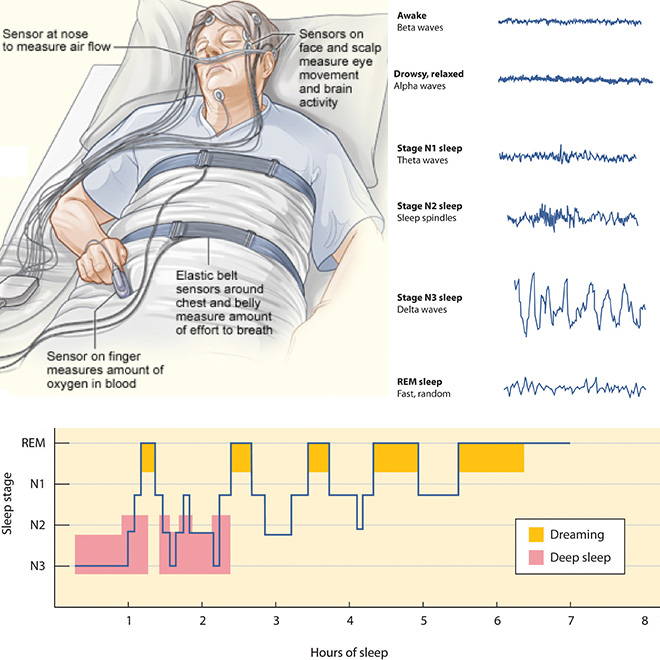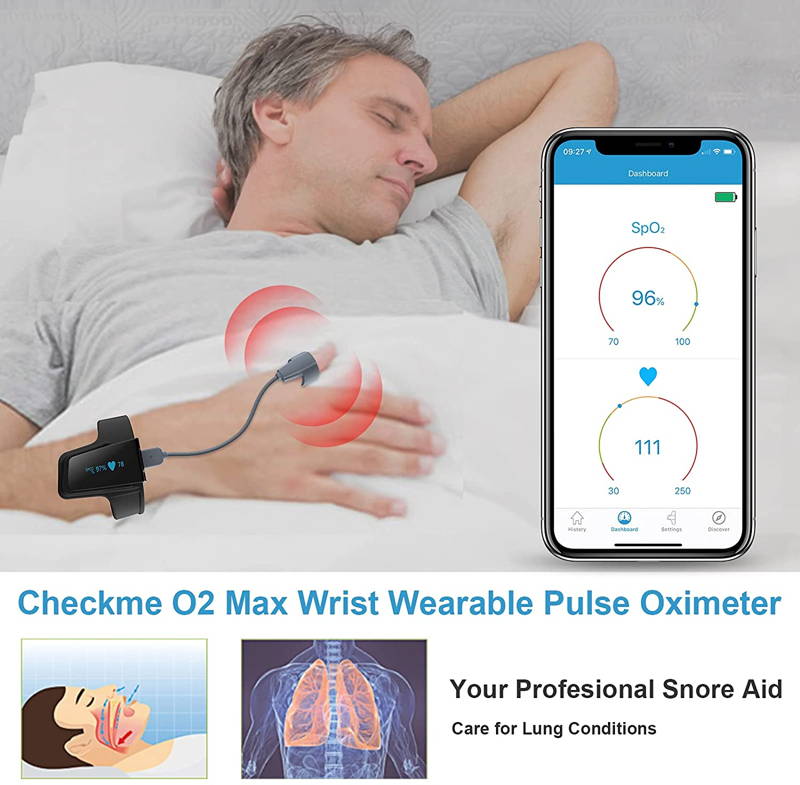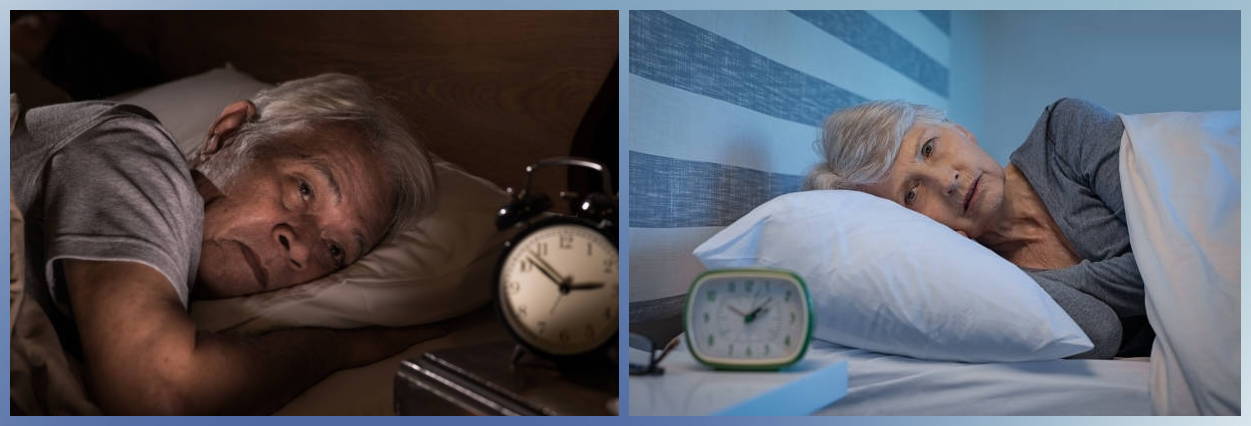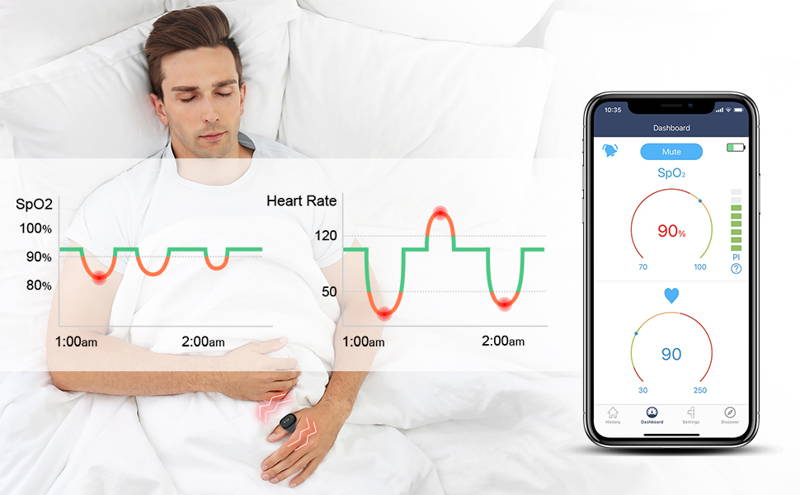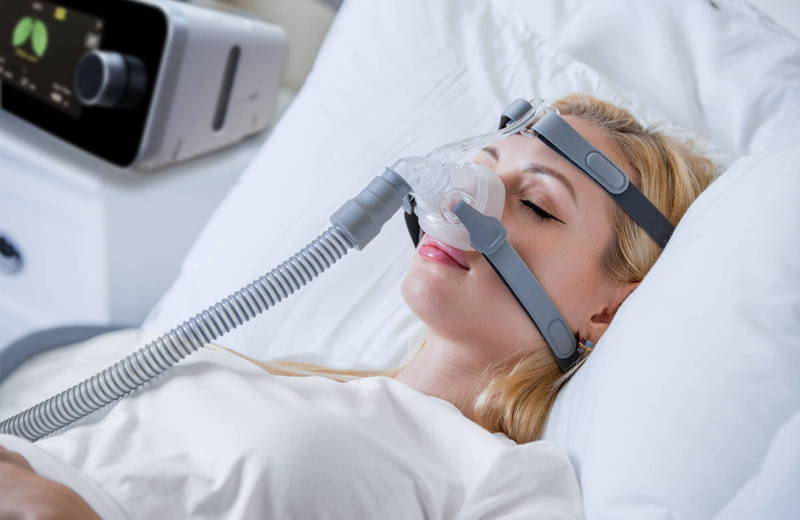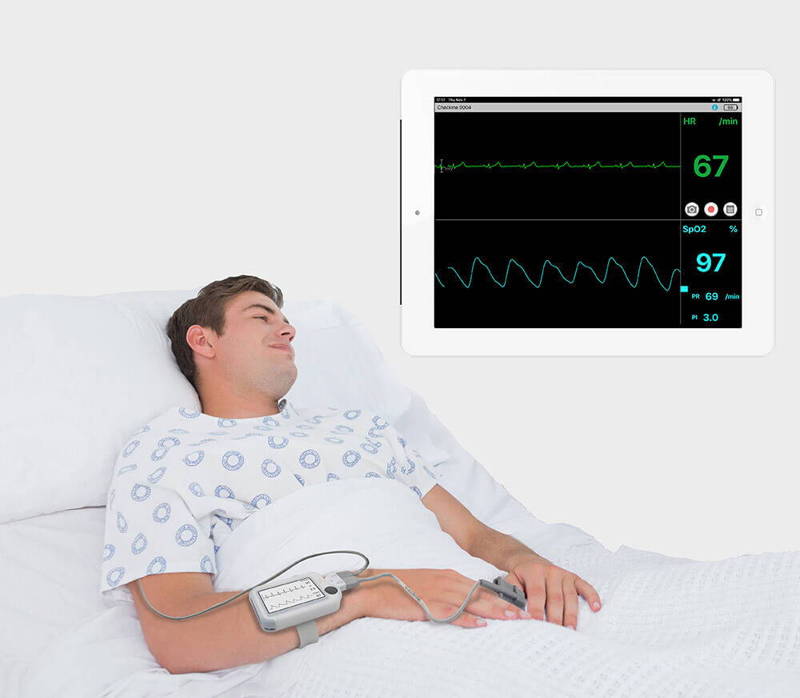When Sleep Becomes a Problem, Know More about Your Sleep Study
- "Doctor, I have had insomnia recently. What's wrong with my body?"
- "Have a sleep study first, please."
- "Doctor, I always snore when sleeping."
- "You may need to undergo a sleep study at first, and then I can diagnose it."
- "Doctor, I often sleepwalk during the night."
- "Firstly, please get a sleep study"
When it comes to going to the hospital for tests, people have a certain understanding of having blood drawn to measure blood lipids, liver function, etc., having an endoscopy to view the stomach and intestines and some normal tests. However, when we go to the hospital to see a sleep disorder, the doctor will recommend that we first have a sleep study. Then many patients may wonder what the sleep study is? How can the doctor tell whether I am sick from one sleep study?
What Is a Sleep Study
The sleep study involves one person sleeping overnight at a sleep center, in a hospital, or even a special hotel room, where a doctor can get information about his breathing, oxygen levels in his blood, sleep death, etc. Various wires are attached to his body before he goes to sleep, similar to a 12-lead electrocardiogram, but more wires. The doctor will evaluate the data collected by a technologist, and diagnose what problems the person has with his sleep and the severity of those problems.
Different types of sleep studies include:
- Polysomnography
- Multiple Sleep Latency Test
- CPAP Titration
- Home Sleep Apnea Testing
Sleep Study Test Results
Monitoring an overnight sleep condition can collect a lot of raw information, which can then be analyzed by the doctor, and further indicators can be obtained.
1. Sleep depth
By monitoring and recording the brain's EEG (electroencephalography) and eye movements, the doctor can analyze and judge whether the one slept well or not. For snoring patients, the better the sleep, the heavier the snoring condition might be that night, and the examination can better reflect the snoring condition; on the contrary, the examination might not reflect the real snoring condition well. For patients with insomnia, the analysis of sleep depth is a good reflection of the patient's real sleep condition, rather than just relying on the patient's description.
2. Blood oxygen saturation
Collecting the change of oxygen levels in the blood overnight can determine the severity of snoring. As this following pic shows, Checkme™ O2 Max Wrist Oxygen Monitor can monitor your SpO2 for long-time, up to 72 hours. Its comfortable wearing method will not disturb your deep sleep.
3. Breathing patterns
By monitoring the airflow and temperature changes of the mouth and nose, and the degree of movement of the thorax and abdomen, the doctor can know whether the patient has sleep apnea and whether the apnea is caused by airway obstruction or by a central problem.
4. Muscle activity during sleep
The muscle activity during sleep helps the doctor to determine the depth of sleep and to assess the presence of diseases such as RLS (restless leg syndrome).
5. Electrocardiogram
The doctor can use the ECG to detect cardiac abnormalities that occur during sleep.
6. Other stats
In addition, a sleep study monitors body movement and intraesophageal pressure, thus it is an essential test for diagnosing sleep-related disorders.
When Do I Need to Have a Sleep Study
If you have symptoms such as snoring, breath-holding, insomnia, sleepwalking, excessive daytime sleepiness, morning dizziness and headache, a sleep study is needed.
When you get a sleep study in the hospital, you may feel slight discomfort due to the lead wires. If your sleep is affected by some factors, it is necessary to re-monitor again.
How Much Does a Sleep Study Cost
The cost of a sleep study varies from the type of testing being used and what a facility charges. Usually, an in-center sleep study costs about $500-$3000.
It is recommended that you go to the hospital if you have severe symptoms and have money and time. But if you just snore in your sleep and want to screen whether you have mild sleep disorder, you can use some continuous overnight oxygen monitor to see your health conditions, such as Wellue's continuous oxygen monitors or vital signs monitors, which are cheaper and convenient to monitor your sleep condition.
Wellue's Sleep Monitoring Solution
Wellue provides customers home used monitoring products, which is affordable and more convenient. Wellue's O2Ring continuous oxygen monitor is reviewed as the best-in-class option for overnight oxygen monitoring.
Continuous Overnight Blood Oxygen Monitor
Continuous overnight oxygen monitor is designed for home test, providing important indicators of human health.
Types
By its design, Wellue has ring oxygen monitor and wrist oxygen monitor.
By its function, there are sleep apnea oxygen monitor and pediatric oxygen monitor, both with vibrate alarm.
By its users, Wellue has continuous overnight blood oxygen monitor for family, for baby and for patients with obstructive sleep apnea or chronic obstructive pulmonary disease.
Benefits of Wellue Home Continuous Overnight Oxygen Monitor with FREE APP
Continuous oxygen monitoring is a better way to prescribe long-term oxygen therapy.
- Continuously monitoring oxygen levels in the blood
First, it can monitor one's oxygen saturation over time, providing more utility for trends over time instead of absolute thresholds. See Wellue's O2Ring Continuous Ring Oxygen Monitor as the following pic. As a sleep apnea oxygen monitor, it can monitor your blood oxygen saturation for all night, up to 12 hours. Additonally, it has optional silent vibration and audio alarms to alert when the SpO2 and heart rate are abnormal.
- Alarms for low oxygen levels and abnormal heart rate
Second, if your oxygen levels are dangerously low or your abnormal heart rates are detected, it can alert with vibration or audio alarm on the APP, which is particularly helpful for newborns or patients with obstructive sleep apnea.
- PDF/CSV Analysis and trend charts from Free APP & PC Software can be shared with doctors
Third, the support of data recording and sharing actually could offer peace of mind to people with chronic respiratory or cardiovascular conditions, or people under anesthesia, and also help doctors to diagnose and make treatment plans quicker.
- Helpful for treatments, even for remote patients monitoring
Fourth, Wellue's wearable oxygen monitors with its APP can also help assess the need for supplemental oxygen. For instance, when this is done overnight, a continuous measurement can be graphed. The graph can be shared, so as to help the doctor see if you have enough oxygen in your body when you sleep and ensure the amount of supplemental oxygen. The Oxylink™ Remote Oxygen Monitor with a remote linker, showing in the next pic, is a product for long-distance monitoring, which offers a telehealth solution for homecare and clinic. Especially, the remote linker is a telehealth device suitable for quarantined patients monitoring, family remote monitoring, elderly care and community health care. With the remote linker, the real-time SpO2, pulse rate, pulse wave will transfer via Wi-Fi, and so it's easy to share the data with the doctor. Then the doctor can make the treatment plans quicker.
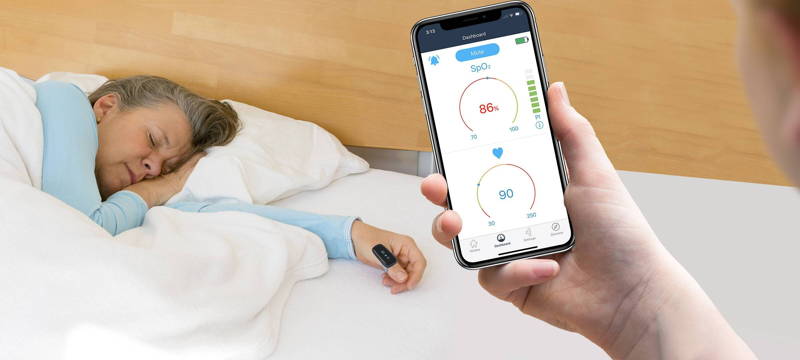
- Showing the important indicator of human health
Fifth, the continuously monitored blood oxygen saturation level will indicate dangerous side effects in people taking drugs that affect breathing or oxygen saturation, so as to
Wellue PAP machine for patients with sleep apnea
Patients with severe sleep apnea such as OSA will be suggested by the doctor to treat with a CPAP machine.
Wellue iBreeze™ APAP Machine (See here) changes the pressure level of the air to a patient on a breath by breath basis, far advanced than traditional CPAPs. But Wellue's iBreeze Auto-CPAP Machine also has a CPAP mode which maintains the air pressure at a fixed value. The user is able to discover which therapy mode really works better. This iBreeze™ APAP Machine will free your breath for a night of sleep.
In addition, Wellue iBreeze™ BiPAP Machine is ideal for treating COPD, OSA, CSA, OHA, etc. It will safeguard your respiratory health. More about iBreeze™BiPAP Machine.
Wellue's vital signs monitor for screening sleep apnea
Wellue Checkme™ Pro Doctor Vital Signs Monitor is an all-in-one solution for mobile medical, and also a smart choice for family healthcare & clinical check. It can continuously monitor SPO2 for up to 10 hours and can be used as an ECG Holter. Using it to screen sleep apnea is a nice choice, whether for personal or doctors. Check this following pic and you will get more information.
What happened to you at a sleep study appointment?
Share your story with us!
Feel free to leave a comment, please.


